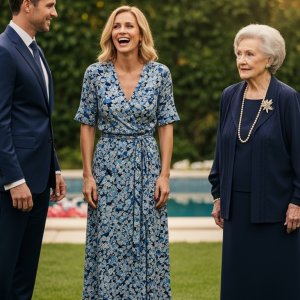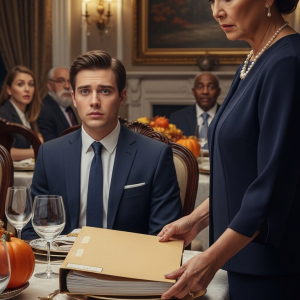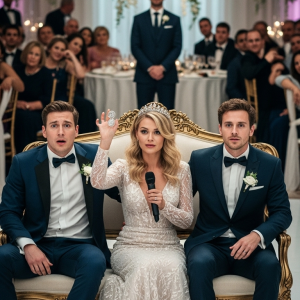David Lim’s world was one of glass, steel, and projected quarterly earnings. From his corner office on the 34th floor, downtown Los Angeles sprawled beneath him, a grid of concrete and ambition that he intended to conquer. He was a master of the buzzword: disruption, scalability, synergy, leverage. He saw the world not as it was, but as a series of inefficient systems waiting to be optimized, monetized, and scaled.
His latest venture, “Agri-Future,” was his magnum opus. The plan was simple: acquire under-utilized agricultural land, tear down the inefficient old ways of farming, and erect state-of-the-art hydroponic greenhouses. It was clean, predictable, and, most importantly, incredibly profitable. His biggest coup had been securing a significant seed investment from Elysian Cosmetics, a titan in the luxury beauty industry. The CEO, the formidable Isabelle Devereaux, was, in David’s own words, his mentor and key partner.
“Isabelle doesn’t just invest in companies; she invests in visionaries,” David would often boast to his team, his voice slick with self-assurance. “She and I are perfectly aligned. We see the future. We don’t have time for nostalgia.”
That nostalgia was, in his mind, perfectly embodied by his father-in-law, Mr. Chen. David loved his wife, Lian, but he viewed her father with a kind of pitying condescension. Mr. Chen was a relic, a stubborn old man pottering around his “hobby farm” in a forgotten valley two hours north of the city. A man who talked to his plants and followed the cycles of the moon. David saw the farm not as a legacy, but as a tragically under-leveraged asset. And he had a plan to change that.
Mr. Chen’s world moved at a different pace, dictated not by stock tickers but by the slow, deliberate rhythm of the seasons. His farm was nestled in a small, unique microclimate, a pocket of cool, misty air protected by a crescent of low mountains. It was a place of profound quiet, where the only sounds were the rustle of leaves, the buzz of bees, and the gentle murmur of a stream that snaked through the property.
His work was a ritual, a form of meditation. He cultivated a dozen different herbs and vegetables, but the heart of his farm, a section he kept intensely private, was a field of small, unassuming plants. They had delicate, silvery leaves and produced a single, pale blossom that opened only under the light of the full moon. He called it ‘Nguyệt Kiến’, or “Moonpetal.” It was a plant his ancestors had cultivated for centuries, and he was the last in his line who knew its secrets.
Lian, his daughter, was caught in the gravitational pull of these two opposing worlds. She loved the peace of the farm, the scent of the earth that reminded her of her childhood. But she was also swept up in David’s whirlwind of ambition. She saw the logic in his plans, the undeniable allure of progress and financial security.
“Dad, David’s investors are coming for dinner next week,” she said one afternoon, her voice hesitant as she watched her father carefully mulch the base of a Moonpetal plant. “He wants to… present some ideas to you.”
Mr. Chen didn’t look up. He simply continued his work, his hands moving with a practiced, gentle efficiency. “His ideas are loud, Lian. They leave no room for things to grow quietly.”
Lian had noticed the quiet things. Over the years, she had seen sleek, black sedans with European plates make the long journey to the farm. Her father had brushed off her questions, saying they were “botanists, just old friends coming to exchange notes.” She didn’t press. She trusted him. But a part of her wondered, just as David did, what secrets this quiet life held.
Her father paused, finally looking at her. His eyes were kind, but held a deep, ancient wisdom that David’s sharp, modern gaze could never comprehend. “There are things of value that cannot be seen with the eyes, Lian,” he said, echoing a sentiment he had once tried, and failed, to explain to her husband. “Your husband is too hasty. He only sees the surface of the water, never the currents that run beneath.”
The evening of the dinner was cool and clear. David had orchestrated the event with military precision. Three of his primary investors, sharp-suited men who looked deeply out of place amidst the rustic charm of the farm, were seated on the large wooden deck overlooking the valley. David had even brought a large, portable projection screen, a stark white rectangle against the deepening twilight.
He began the “tour” earlier, striding through the farm with the investors in tow, pointing out all its perceived flaws. “As you can see, the irrigation is archaic,” he said, gesturing dismissively at a network of simple channels. “No soil sensors, no automation. And this section here,” he said, stopping at the edge of the sacred Moonpetal field, “is the most criminal waste of space. He’s growing… weeds. We’ve had them analyzed. No known commercial value.”
Mr. Chen had followed them silently, his hands clasped behind his back, his expression unreadable. Lian trailed behind, a knot of anxiety tightening in her stomach.
Now, at dinner, David was in his element. He clicked a remote, and the screen behind him lit up with the sleek logo of Agri-Future. “Gentlemen,” he began, his voice resonating with rehearsed passion. “Welcome to the future of agriculture.”
For twenty minutes, he laid out his vision. Renderings of massive, gleaming hydroponic greenhouses replaced the rolling fields on the screen. Bar charts showed projected profits. He spoke of efficiency, of maximizing yield, of feeding the ever-growing demand for organic produce in the city.
He then turned to his father-in-law, his tone shifting to one of magnanimous condescension. “Dad,” he said, his voice dripping with false sincerity. “Your work here, your tradition… it’s quaint. It’s admirable. But it’s a hobby. This,” he gestured to the screen, “is business. Real business. To build this future, we have to clear out the past. We have to get rid of these weeds and finally maximize the potential of this land.”
The investors nodded, impressed by the slick presentation and the undeniable logic of profit. Mr. Chen said nothing. He simply took a slow, deliberate sip of his jasmine tea, his eyes calm and steady.
It was in that moment of David’s ultimate triumph that the crunch of tires on the gravel driveway announced a new arrival.
Headlights swept across the deck, momentarily blinding everyone. A long, impossibly elegant Rolls-Royce Ghost glided to a stop. A chauffeur in a black suit emerged and opened the rear door.
A woman stepped out. She was the picture of power, dressed in a sharp, bespoke Armani suit, her silver hair cut in a severe, elegant bob.
David’s face split into a triumphant grin. “Well, speak of the angel investor!” he boomed, rising to his feet. “Gentlemen, what a perfect surprise! This is the visionary I was telling you about. Please, everyone, a warm welcome for Ms. Isabelle Devereaux, the CEO of Elysian Cosmetics and one of my most trusted partners!”
The investors immediately straightened their ties, their expressions a mixture of awe and excitement. This was a major power player. David’s connection was real.
Isabelle Devereaux ascended the steps to the deck, a polite but distant smile on her face. David moved to greet her, his hand outstretched, ready to guide her to the seat of honor.
But she walked right past him.
She made a straight line for the quiet old man at the head of the table. Her smile transformed, shedding its corporate frost and blooming into one of genuine, profound respect. She extended her hand to Mr. Chen.
“Mr. Chen,” she said, her voice warm and clear. “It is an absolute honor to finally be here. Your farm is even more beautiful than the pictures.”
Mr. Chen stood and took her hand in both of his. “Ms. Devereaux. Welcome. The moon is almost full. The plants are at their best. Please, have some tea.”
David stood frozen, his hand still awkwardly extended in mid-air. The investors exchanged confused glances.
“I am just so thrilled about our agreement,” Isabelle continued, her focus entirely on Mr. Chen. “Elysian is incredibly honored to become the exclusive global distributor for your Moonpetal herb. The seven-million-dollar annual licensing fee is a small price to pay to secure the future of our entire Elysian Luxure skincare line.”
The silence on the deck was absolute, broken only by the chirping of crickets. Seven million dollars. A year. David’s jaw hung open. He looked as if he had been struck by lightning.
Isabelle finally turned her attention to him. The warmth in her eyes vanished, replaced by a glacial sheet of ice. The smile was gone.
“David,” she said, her voice dangerously quiet. “My head of sourcing tells me you were just presenting a plan to bulldoze this entire field of ‘weeds’.” She took a step closer to him. “The world’s only known supply of the key bio-active ingredient for our company’s three-hundred-million-dollar anti-aging franchise. An ingredient we have spent five years and over twenty million dollars in research to synthesize, and failed.”
She paused, letting the weight of her words crush him.
“Tell me, David. Are you an idiot, or were you actively trying to sabotage my company? Please. I’m dying to know.”
The world, as David knew it, ended in that moment. The color drained from his face. He tried to speak, but only a dry, croaking sound came out. The investors, their faces masks of horror and disbelief, began to quietly gather their things, avoiding his gaze as if he were a contagious disease. They had come to see a visionary; instead, they had witnessed a fool commit professional suicide.
Ms. Devereaux didn’t wait for an answer. She gave David one last look of utter contempt before turning back to Mr. Chen, her professional warmth instantly returning. They spoke for a few more minutes about logistics and shipping schedules, then she departed as gracefully as she had arrived. The Rolls-Royce disappeared down the dark country road, leaving behind a silence thick with ruin.
The investors scurried away with mumbled apologies, leaving David alone with his wife and father-in-law on the deck, his useless projection screen still glowing faintly in the dark.
Lian was the first to speak. She had watched the entire exchange, her initial anxiety melting into a slow, dawning comprehension, which had then curdled into a cold, hard anger. She finally saw her husband not as a visionary, but as a hollow man, a gambler who had been willing to bulldoze her family’s entire legacy for a chance at a quick profit.
“Weeds, David?” she asked, her voice quiet but shaking with fury. “You called my father’s life’s work… weeds? You stood here, in his home, and tried to sell his soul to these men, all while bragging about a partnership you clearly knew nothing about.”
“Lian, I didn’t know…” he stammered. “How could I have known?”
“Because you never listened!” she cried, the words tearing out of her. “You never once asked. You just assumed. You assumed his way was worthless, that your way was better. You looked at this place, at my father, and you saw nothing of value.” She shook her head, a look of finality settling on her face. “You saw nothing.”
The destruction was swift and total. The next morning, a single, curt email from Ms. Devereaux’s office informed David that Elysian Cosmetics was divesting from all his ventures, effective immediately. Spooked by Elysian’s sudden exit, the other investors pulled out in a panicked cascade. Agri-Future collapsed within forty-eight hours. The story of his spectacular blunder spread through the financial community like wildfire. He became a punchline, a cautionary tale: the man who tried to bulldoze a goldmine to plant lettuce.
A year later, the farm was unchanged, yet transformed. The rhythm of Mr. Chen’s life remained the same—he still woke before dawn, still tended his plants with a quiet reverence. But the world now came to him. Botanists, researchers, and pharmacologists from the most prestigious institutions now made pilgrimages to his valley, not as secret visitors, but as honored guests.
With the first installment from his contract with Elysian, Mr. Chen had not bought a new car or a bigger house. Instead, he had funded the construction of a beautiful, modest building at the edge of his property: The Mei-Ling Chen Center for the Study and Preservation of Traditional Botany, named for his late wife. It was a place for young researchers to study the wisdom of the old ways, a library of living plants.
Lian was there, by his side. After separating from David, she had returned to the farm, not in defeat, but in search of a purpose she had almost lost. She rediscovered the rhythms of her childhood, learning the secrets of the soil that she had long forgotten. She managed the business side of the partnership with Elysian, her sharp mind now applied to preserving her heritage, not erasing it. She had found a new kind of success, one that was quiet, sustainable, and deeply meaningful.
One evening, as a full moon rose over the valley, casting a silver glow over the fields, Lian walked with her father among the blooming Moonpetals. Their pale blossoms were open to the night sky, releasing a faint, ethereal fragrance.
“He never understood,” Lian said softly, thinking of David. “He thought progress was about tearing things down.”
Mr. Chen stopped and gently touched one of the delicate blossoms. “True progress is not about destruction,” he said, his voice calm and steady as the mountains around them. “It is about understanding what is worth preserving. It is about having the patience to let things grow in their own time.”
He looked at his daughter, his eyes filled with love and pride. He had not only saved his farm; he had reclaimed his daughter and secured a legacy that would continue to grow, quietly and powerfully, long after the noisy ambitions of men like David had faded into dust.



